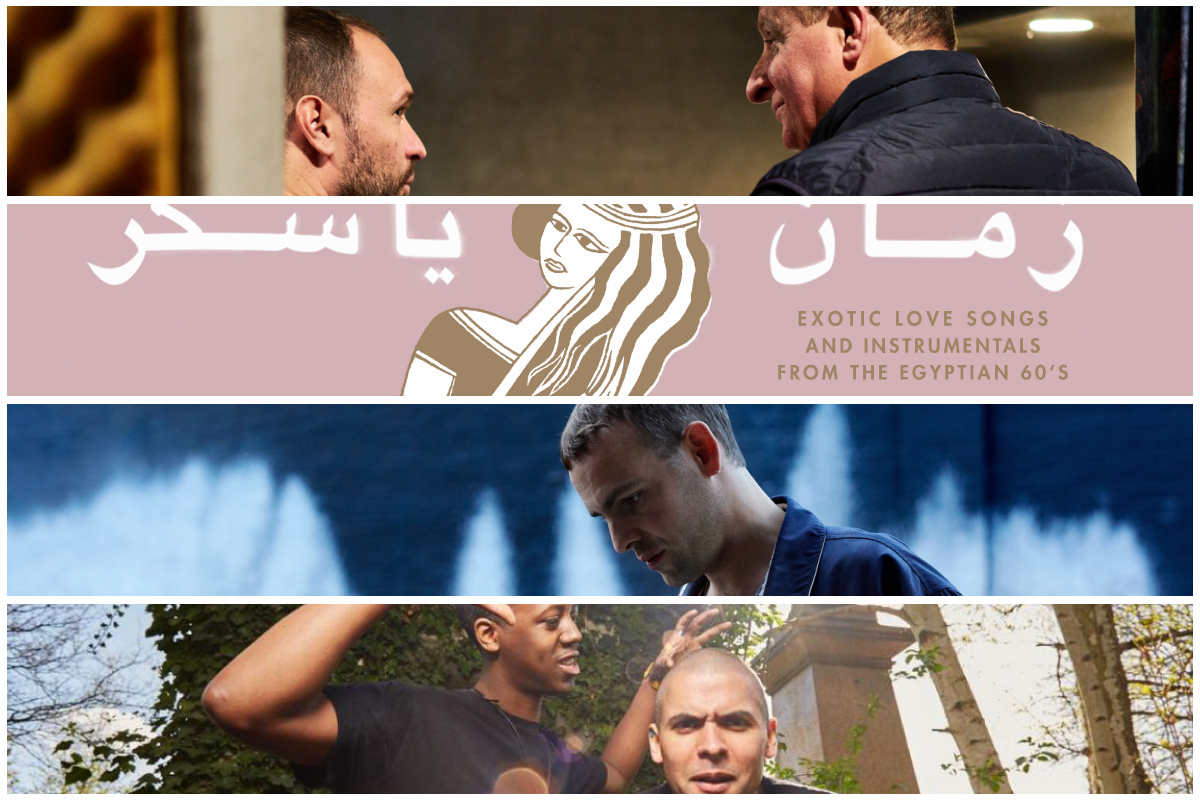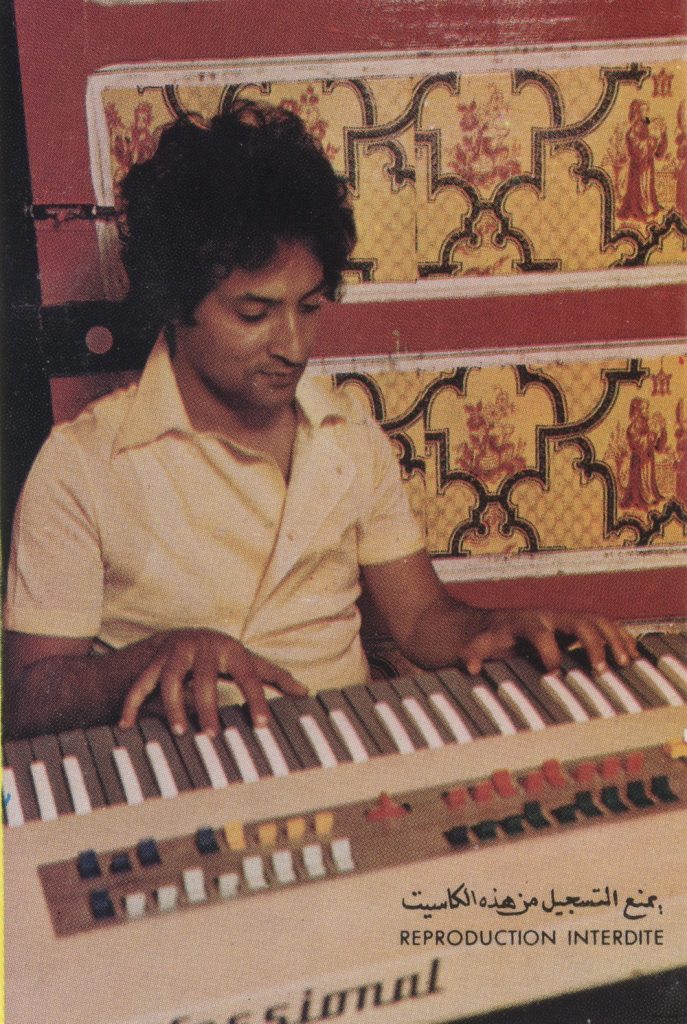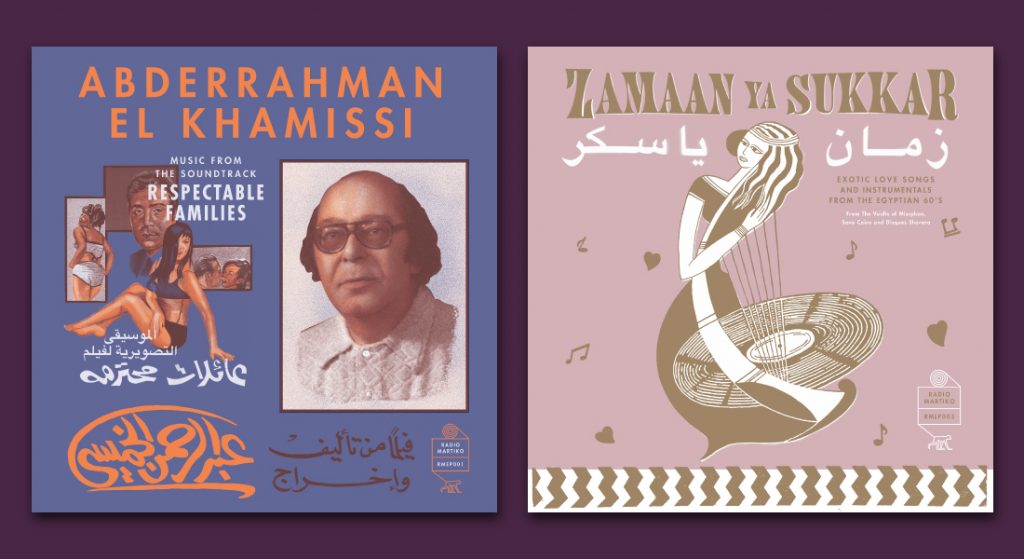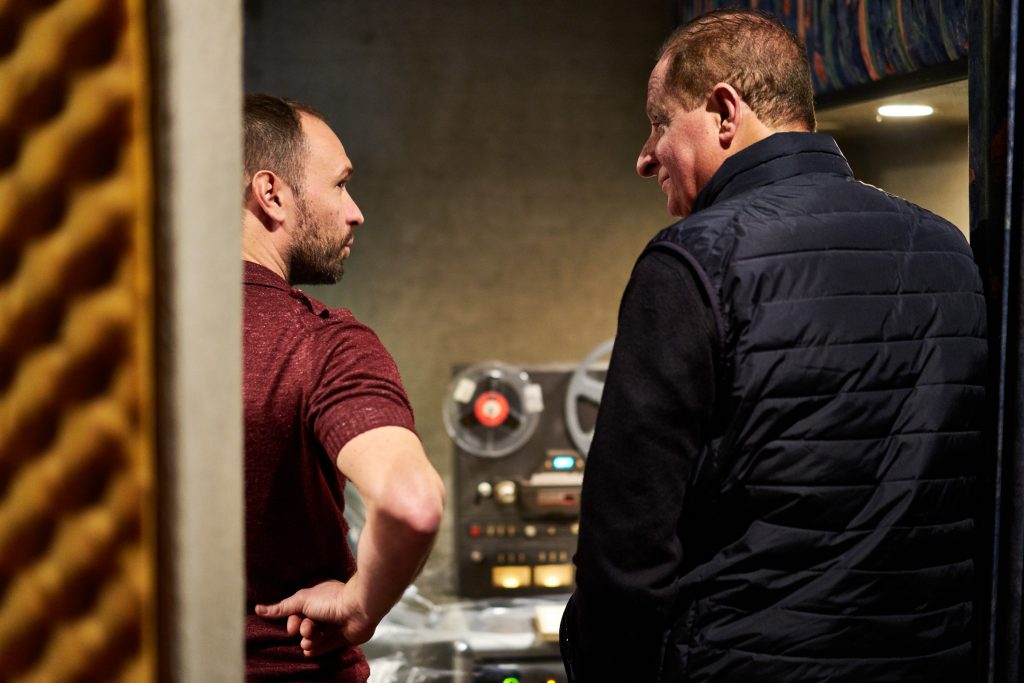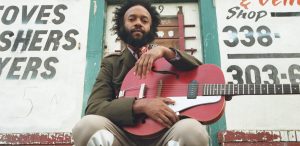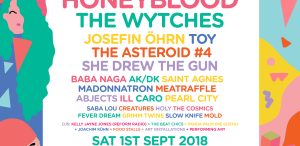Welcome to the Guide to the Week of Music, a round-up of music news, media and releases from the wide musical world. This week, we catch up with the founders of the Belgian label and DJ collective, Radio Martiko. We also have some new sounds and visuals from across the globe, to share with you.
Radio Martiko discuss Abdou El Omari, their new releases and forthcoming exposition
Radio Martiko are one of several contemporary record labels working diligently to bring rare music to a wider audience. Based in Belgium, the tight-knit team of DJs and crate diggers travel throughout Europe, Africa and South America, guided by the artists and records that deeply fascinate them. They often find that historic record companies, physical media and artistic legacies, lie in tatters. However, through their archival efforts, remastered and released audio, they intend the breathe new life into music that has been largely forgotten.
Each re-issue label has its crowning achievement; the one artists whose popularity has measurably increased as a result of the label’s efforts. The late William Onyeabor is that artist for Luaka Bop, Hailu Mergia for Awesome Tapes from Africa and Abdou El Omari is certainly that artist for Radio Martiko. The late Moroccan keyboardist and composer created some remarkable music, which wasn’t widely available outside of his home country, having been pressed only once in the mid-seventies. Radio Martiko travelled to Morocco, met the founder of Diques Gam and managed not only to negotiate a re-issue of his original LP, but also two full LPs that had never seen the light of day! We interviewed the guys at the time of this re-issue and are thrilled to catch up with them again, as they prepare two new releases and an exposition of their work.
We last spoke in late 2016, as you were preparing to re-release Nuits D’Ete avec Abdou El Omari. What has happened since and have you found out anything else about Abdou, since that time?
‘We released the other two parts of the Nuits trilogy for the first time. All the parts of the trilogy seemed to please a lot of people and sold really well. However, the first part is still the most ‘in demand’ album of the trilogy. As it is sold out in most places and a lot of sellers are still asking for it, we will do a limited repress.’
‘In the meantime, we went to Morocco a few times and tried to find out more about Abdou El Omari. As he didn’t have any children, we had to look for people who worked with him in the past to give us more information about him. We didn’t meet many people who knew him, we didn’t get a lot of information and the information we did get was often contradictory. For instance, someone said that the music was recorded in Holland while somebody else told us it was recorded in Morocco. Someone told us that the musicians were from Europe, while somebody else told us that the band was made out of members of the Golden hands…I guess a lot of things will stay mysterious about these records.
From talking to people who knew Omari, we got an impression of who Omari was as a person. Apparently, Omari had the reputation of a very creative man, who somewhat lived in his own dream world, but he was always very attentive for the people he met. Everybody spoke with lots of love about him and his passing still seemed to evoke a lot of emotions after all these years.
Here are some things we know for sure: Omari was one of the best hairdressers in Morocco, who worked for celebrities and the royal family. He often participated in competitions for hairdressers and won quite a few of them. He had his own hairdressing salon in Casablanca. We visited the place, but nothing was left of the original salon. Apparently, everything was destroyed after his death. A former employee rescued Omari’s personal copy of Nuits d’été from a garbage container in the street. A friend in Morocco still has this album. One famous diva that got her hair done by Omari, was Naima Samih, who sings on the second part of the Omari trilogy. She is one of the most famous singers in Morocco. Every Moroccan knows her song Jrit Ou Jarit by heart.
When Naima Samih found out that Omari was a musician, they started to play together and made plans to record an album. At the same time, Omari got in touch with Boujema Gam, the owner of the record store and label Disques Gam. His was the only Moroccan record store that specialised in Western music. Omari was influenced by music from other cultures, mostly Egyptian and Western music. Gam and Omari shared their mutual musical interests and worked together to make the Nuits trilogy.’
‘A few years before his death, Omari recorded some hip-hop songs. He made some cassettes that he sold himself. Up till now, there are no traces of these recordings. He also formed a rock band called Abdou El Omari et les Fugitives. There are some recordings of this band, but the group never made a commercial release.
The end of Omari’s life is rather sad. Omari made some bad investments and lost all his money. At the same time he got pancreatic cancer and wasn’t able to pay his medical bills. A few months ago, Boujema Gam sadly passed away. His legendary record store at the Boulevard de Paris is closed now.’
The late keyboardist and composer, Abdou El Omari
You’re soon to release a compilation of Egyptian music from the ‘60s. What can you tell us about the music featured and your adventures tracking it down?
‘We are super proud to release Zamaan Ya Sukkar which means something like ‘Sweet Past’. This compilation will feature exotica, mambo and oriental jazz from the Misrphon, Sono Cairo and Disques Sharara record labels. The songs are very obscure and sound like nothing you’ve heard before. When hearing this music, your mind drifts off to the roaring and magical nightlife of Cairo in the ‘60s.
Besides this compilation we will also release a 10-inch with the 1969 soundtrack of Respectable Families by Abderrahman El Khamissi. El Khamissi was a very colourful character. He was a poet, writer, movie director, political activist and composer. This soundtrack is a unique musical document. The music sounds very contemporary although it was written half a century ago. Khamissi blends influences from different musical styles to a very personal distinctive sound. You’ll hear a dark tango with strange harmonies to call vampires and a mysterious twist which he names African Dance.’
Music from the Soundtrack Respectable Families by Abderrahman El Khamissi and compilation Zamaan Ya Sukkar – Exotic Love Songs and Instrumentals from the Egyptian 60’s
‘We’ve been collecting Egyptian music for quite some time. First, we bought music online or from local collectors. Three years ago, we went to Cairo to dig for records for the first time. Cairo was the cultural centre of the Arabic world for many years. The Egyptian music industry from the ‘50s until the ‘70s was super productive and the musical heritage from that time is huge. Every time we go to Egypt, we keep discovering amazing music.
In order to license the music we wanted to release, we had to get in touch with record companies, such as Sono Cairo. When you visit record companies, there’s often not much left of the grandeur of the old days. Record companies are mostly housed in modern, boring, sterile buildings. With Sono Cairo however, we were thrown back to the golden age of the music industry. You can still visit the old recording studios where big stars like Oum Kalsoum, Abdel Halim Hafez or more obscure artists recorded their songs. Nowadays Sono Cairo is still owned by the state and employs over 1500 people. The company is kept alive in a sort of artificial way, because the prestige of the label is so big. We are working on several reissues with music from the Sono Cairo catalogue and other Egyptian labels. We hope to keep Egypt’s musical heritage alive and to share this music with people who didn’t know these sounds before.’
Unfortunately, you aren’t able to meet all of the artists whose work you license, but you did get chance to meet the great Alfredito Linares! How was it spending time with him, did he appreciate you re-releasing his music and did he pass on any wise words or advice?
‘We had some contact with Alfredito Linares before, but it was only on our latest trip to Colombia in April—almost two years after releasing Boogaloo Girl—that we were able to finally meet him. We visited Alfredito and his wife Isabel at their house in Cali. As we entered, Alfredito began to play Boogaloo Girl on his piano. So we had a private concert by Linares on a Sunday afternoon in Cali. Life could be worse.
Alfredo is still active as a musician. Two years ago, he released the album Las Perlas Esconditas and performs live from time to time. He seems to be a man who’s very satisfied (as he should be) about the work he did and is still doing. Here in Europe, Linares is not such a big name, but his influence on the music scene in Latin America is enormous. Mambo Rock and Tiahuanaco were huge hits that are part of the collective musical memory in South America. He finds a lot of satisfaction in the fact that he was and is still able to reach so many people with his music.
We were glad to see that Alfredo really seemed to appreciate what we do. He was also interested in the other music we released. He took some time to check the album of Hany Mehanna and seemed to be intrigued by the music.’
In addition to the label, you’re all DJ’ing regularly and working on other projects. What do you have planned for the rest of the year?
‘We’ve been working on a Greek compilation for four years now. Now, we can finally start to work on the production. If we could have this album under the Christmas tree, we will be very happy. We’re also preparing releases from Congo and Colombia. Hopefully we can release one or two of them this year as well. We will also start a second record label this year. Our first signing on this label is a rather big name. More details soon.
In September, we will have an exposition at Darna, the Flemish-Moroccan cultural centre in Brussels. With old records sleeves, music and pictures we will try to give an impression of the Moroccan music scene in the ‘60s and ‘70s. The main focus of the exposition will be on the Boussiphone label, which was the biggest labels in Morocco from the ‘30s till the late ‘90s. They released thousands of records and cassettes over the years. Most releases were traditional Moroccan music, but they also released crossover artists like Fadoul and songs from other countries like Algeria, Egypt and Mauritania.
We have had the honour to work with Boussiphone for the past two years. During this period, we collected a huge part of the catalogue. At this moment, we have about 1,500 unique Boussiphone singles. We have access to the archive from the label and we found another huge stock in Casablanca. We have quite some records that are absolutely unknown. In the end, we should be able to get almost every reference from their catalogue on 45. As we have a very unique collection in our hands, we hope to be able to archive this collection and to make it available for the public. Archiving these recordings will be a huge work and it will takes months to do this. At this moment, we’re looking for fundings or partners for this project, which is not so easy. When it comes to cultural heritage: rocks, buildings and paintings are doing well, but musical heritage is not always valued as it should be. Fingers crossed, I would say.’
Fred Kramer of Radio Martiko and Hany Mehanna in Mehanna’s former studio, Cairo. © Hannes Vandenbroucke
New sounds
Binker & Moses release their astonishing new LP Alive in the East today. Yussef Dayes and Moses Boyd playing side-by-side may be a dizzying prospect, but their sounds meld nicely on the record, which was made at the now-jeopardised Total Refreshment Centre in London. Saxophonist Evan Parker, trumpeter Byron Wallen and harpist Tori Handsley add a tonal breadth to this energising set, moving freely between passages of improvisation and vigorous riffs. The album is a strong companion to Journey To The Mountain of Forever, one of Vinyl Factory’s favourites of 2017 and its material is certain to stir the audience into a frenzy, should they choose to play some of it at Band on the Wall next month!
If Binker & Moses’ record impresses you, then the epic Spirit Rejoin by Al Doum & The Faryds should also float your boat! The group draw from the sounds of Miles Davis, Dr. John, Brother Ah and Santana, creating a fine blend of electric jazz, space and blues-rock.
New visuals
Amen Dunes released a new video for Believe this week. Directed by Steven Brahms, it stars singer-songwriter Damon McMahon, with home footage interspersed between shots of the artist. McMahon believes Freedom to contain some of the best songs he’s ever written and this breezy modern classic certain attests to that.
Fantastic Negrito and Saint Agnes also released fantastic new videos recently. Fantastic Negrito’s video for The Duffler features a range of backstage and live footage, capturing the songwriter in high spirits as he goes from strength to strength, physically and artistically.
Saint Agnes’ video for their dark, gritty and grooving epic The Witching Hour, sees the group cruising through ‘Silvertown’, ripping guitar and keyboard solos from the comfort of their drop top. One for fans of The Black Angels, L.A. Witch and The Limiñanas. Saint Agnes are among the awesome bands playing at this year’s Manchester Psych Fest.
Photo credits:
All Radio Martiko photographs © Hannes Vandenbroucke
Amen Dunes photograph Micheal Schmelling


